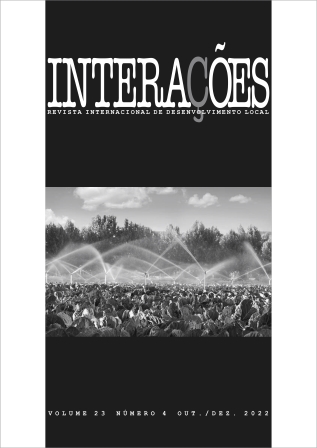The energy use of biogas as a tool for the goals of sustainable development
Keywords:
energy, environmental impacts, greenhouse gases, climate change, methaneAbstract
The global demand for energy and food generates, both in the countryside and in the city, environmental impacts, and many of these are due to the poor disposal of organic waste. One way to minimize these impacts on the environment is to carry out the treatment of waste generated in the various sectors. Among the possibilities for treating organic waste is anaerobic digestion. After this process, there is the production of biogas, which is composed of several gases, including methane and carbon dioxide as the main ones. Biogas has energy potential, being able to generate electrical and thermal energy, in addition to being used in the form of biomethane. With the diversity of energy applications and the possibility of reducing waste, both anaerobic digestion and biogas contribute to the implementation and application of the Sustainable Development Goals (SDGs). These goals have a wide scope, ranging from the need for basic sanitation, clean and accessible energy for all, sustainable cities and communities, responsible consumption, to actions against global climate change, through the reduction of greenhouse gases. The objective of this work is to relate the SDGs and the anaerobic digestion of organic waste projects, which contribute both to the significant improvement of a community or region, as well as to environmental, social, and economic issues. The methodology used was the analysis of the concepts served by the use of the anaerobic digestion system in accordance with the objectives, goals, and sub-targets of the SDGs. The interrelation of at least five SDGs was observed: 6, 7, 11, 12, and 13. The use of anaerobic systems with the use of biogas helps in the substitution and/or reduction of energy sources not renewable resources, which can be applied both in the city and in the countryside, promoting a better quality of life for all.
References
ATLAS DO DESENVOLVIMENTO HUMANO NO BRASIL [ATLASBR]. % de interações por doenças relacionadas ao saneamento ambiental inadequado DATASUS. [s.l.], 2017. Disponível em: http://www.atlasbrasil.org.br/consulta/planilha. Acesso em: 23 dez. 2021.
BALBUENO, L. R.; TIBURTINO-SILVA, L. A.; NOGUEIRA, M. L.; MACIEL, J. DE C.; DA COSTA, R. B. Tratamento de resíduos sólidos no município de Bonito, Mato Grosso do Sul, Brasil, correlacionado com dados externos. Interações, Campo Grande, v. 22, n. 3, p. 883–905, 3 nov. 2021.
BRASIL. Ministério da Ciência, Tecnologia e Inovação. Secretaria de Políticas e Programas de Pesquisa e Desenvolvimento. Estimativas anuais de emissões de gases de efeito estufa no Brasil. Brasília, DF: MCTI, 2020. 108 p. Disponível em: https://www.gov.br/mcti/pt-br/acompanhe-o-mcti/cgcl/clima/arquivos/estimativas-anuais-de-emissoes-de-gases-de-efeito-estufa/livro_digital_5ed_estimativas_anuais.pdf. Acesso em: 10 jan. 2022.
CENTRO INTERNACIONAL DE ENERGIAS RENOVÁVEIS [CIBIOGÁS]. Panorama do Biogás no Brasil 2020. Foz do Iguaçu, 2021. Disponível em: https://cibiogas.org/wp-content/uploads/2021/04/PANORAMA-DO-BIOGÁS-NO-BRASIL-2020-v.8.0-1.pdf. Acesso em: 11 jun. 2021.
CHERNICHARO, C. A. L. Reatores anaeróbios. 2. ed. Belo Horizonte: UFMG, 2019.
EMPRESA DE PESQUISA ENERGÉTICA [EPE]. BEN 2021: relatório síntese 2021 – ano base 2020. Rio de Janeiro, 2021. Disponível em: https://www.epe.gov.br/sites-pt/publicacoes-dados-abertos/publicacoes/PublicacoesArquivos/publicacao-601/topico-588/BEN_S%C3%ADntese_2021_PT.pdf. Acesso em: 23 dez. 2021.
INSTITUTO BRASILEIRO DE GEOGRAFIA E ESTATÍSTICA [IBGE]. População residente enviada ao Tribunal de Contas da União: Brasil, grandes regiões e unidades da federação – 2001-2020. Rio de Janeiro, 2020. disponível em: https://ftp.ibge.gov.br/Estimativas_de_Populacao/Estimativas_2020/serie_2001_2020_TCU.pdf. Acesso em: 23 dez. 2021.
INSTITUTO TRATABRASIL (ITB). Benefícios econômicos e sociais da expansão do saneamento brasileiro. Brasil, 2018. Disponível em: http://www.tratabrasil.org.br/images/estudos/itb/beneficios/sumario_executivo.pdf. Acesso em 23 dez. 2021.
ORGANIZAÇÃO DAS NAÇÕES UNIDAS [ONU]. The 17 goals. [s.l.], 2021. Disponível em: https://sdgs.un.org/goals. Acesso em: 23 dez. 2021.
SILVA, R. F.; MOURA, L. L.; GAVIÃO, L. O.; PONTES, A. T.; LIMA, G. A. B.; BIDONE, E. D. Interdependências e trade-offs entre os objetivos do desenvolvimento sustentável: avaliação de municípios brasileiros pelas três dimensões da sustentabilidade. Interações, Campo Grande, v. 22, n. 2, p. 637–52, abr./jun. 2021.
SISTEMA NACIONAL DE INFORMAÇÕES SOBRE SANEAMENTO [SNIS]. Manejo dos Resíduos Sólidos Urbanos – 2020. Brasília, 2020. Disponível em: https://www.gov.br/mdr/pt-br/assuntos/saneamento/snis/painel/rs. Acesso em: 23 dez. 2021.
WORLD HEALTH ORGANIZATION [WHO]. Who water, sanitation and hygiene: strategy 2018-2025. Geneva: WHO, 2018. Disponível em: https://apps.who.int/iris/bitstream/handle/10665/274273/WHO-CED-PHE-WSH-18.03-eng.pdf?sequence=1&isAllowed=y. Acesso em: 22 dez. 2021.
Downloads
Published
How to Cite
Issue
Section
License
Copyright (c) 2022 Leonardo Pereira Lins, Janine Carvalho Padilha , Andréia Cristina Furtado, Jessica Yuki de Lima Mito

This work is licensed under a Creative Commons Attribution 4.0 International License.
Direitos Autorais para artigos publicados nesta revista são do autor, com direitos de primeira publicação para a revista. Em virtude de aparecerem nesta revista de acesso público, os artigos são de uso gratuito, com atribuições próprias, em aplicações educacionais e não-comerciais.


